Paths of Glory (1957)
Fresh off the commercial and critical success of The Killing, Kubrick and his producer James B. Harris brought Humphrey Cobb’s Paths of Glory to United Artists in 1957, who granted them a $1 million budget to adapt the novel into a film of the same name. The larger budget allowed Kubrick the chance to cast established star Kirk Douglas as the lead role of Colonel Dax. Continuing his role as writer/director, Kubrick co-wrote the screenplay with Jim Thompson once again with Calder Willingham as well. Production took place entirely in Germany, with hundreds of policemen cast as extras to portray the French army.
Paths of Glory showed Kubrick’s continued maturation as a director and auteur with his third feature film before the age of thirty. The film takes place in World War I, with the French and German armies engaging in daily warfare with many casualties on both sides. Paths of Glory centers of the mission led by Colonel Dax, a french officer tasked with the impossible mission of taking the “ant hill,” a fool’s errand. French Generals Broulard (Adolphe Menjou) and Mireau (George Macready) know the task is near impossible but order it anyway, hoping to impress high command with an unlikely victory. The French troops are opposed by the Germans, but the true antagonists of the film are the French generals themselves. To quote Walt Kelly, “We have met the enemy and he is us.”
Kubrick utilizes the star persona of Kirk Douglas as his Colonel Dax, an honorable man who fights for his troops in battle and off the front lines. After the failed attack on the Germans in no-man’s-land, he faces an angry and embarrassed General Mireau back at the chateau. Kubrick’s attention to detail juxtaposes two different settings: the high ceilings, spacious rooms, and luxurious decor of the chateau stages frame the political battle between French high command and officer of the troops Colonel Dax, while this high-class setting offsets the dirty and enclosed warfare trenches that the troops inhabit. General Broulard wants the “cowardice” of his troops who wouldn’t advance on the German line made an of, so one man from each of all three companies faces court martial.
Kubrick flexes his technical prowess and craft in Paths of Glory as his most impressive command of his skills to date. Channeling Max Ophüls again, his use of tracking shots in the trenches and on the battlefield of no-man’s-land create the essential verisimilitude he desires of the brutality of war.
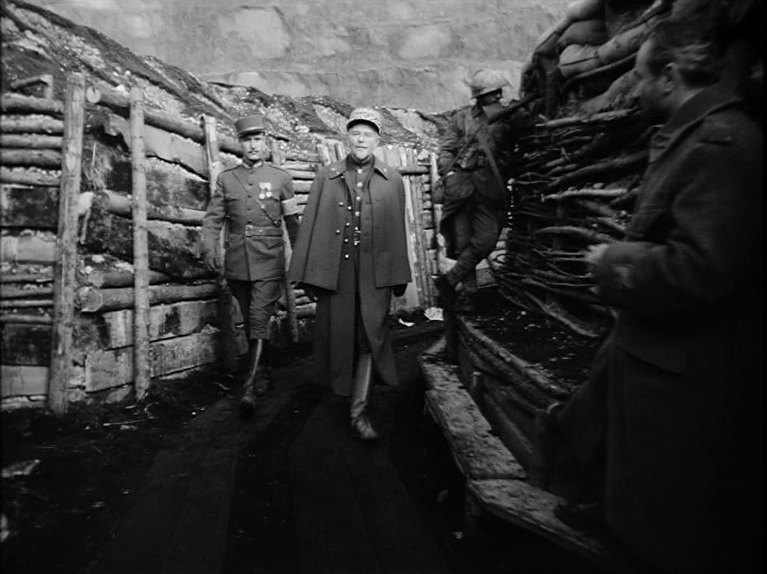
Kubrick employs a long take tracking shot detailing the world of the trenches (George Macready as Gen. Mireau)
A backwards tracking shot leads General Mireau down the trenches his troops inhabit, establishing his disconnect from their reality before he retreats back to the far away bunker of high command. “Are you ready to kill more Germans?” Gen. Mireau clumsily asks his down-trodden troops. He echoes the technique when Colonel Dax greets his troops before they enter the battle they know they can’t win.

Colonel Dax (Kirk Douglas) walks through the trenches in this POV tracking shot
POV shots of Dax seeing the frightened men differ the two similar shots, implying a more grounded and empathetic view of war and the casualties at risk. Lateral tracking shots allow the widespread landscape of troops advancing increase the tension and add a sense of realism to their action. Kubricks meticulous planning extends to the sound design which would become a staple in his career. Paths of Glory has little to no musical score (although an occasionally effective beat of military drums does play) instead relying on the diagetic booms and buzzes of bombs and bullets landing nearby and overhead.

Use of deep focus lenses during the court martial scene in the chateau (Joe Turkel as Pvt. Arnaud)
Along with the difficult but impressive camera movement he would come to be known for, Kubrick and cinematographer George Krause employ use of deep focus cinematography. Compositions staging the three french troops facing trial emphasize the staged nature of “justice” being allocated by the French officers, and details hold strong in the fore, middle, and background. Precise framing (training Kubrick carried over from his work as a photographer) would become a staple for the visionary auteur.
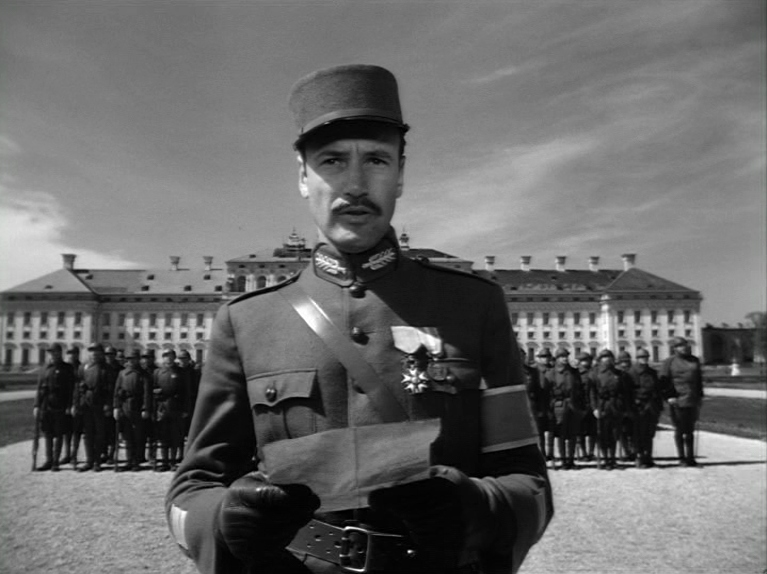
Kubrick’s obsession with symmetrically framed composition beginning to form
Thematically, the film echoes anti-war sentiment as seen decades prior in the 1930 World War I film All Quiet on the Western Front. Colonel Dax is one of the most honorable characters Kubrick would ever put on screen and represents the good he views in men as they struggle against authority and corruption. Kubrick wrote the role to also give Dax the opportunity to defend his men under scrutiny of court martial and eventually firing squad. After giving witness testimony to the illicit order given by General Mireau to fire artillery onto his own troops, an impressed General Broulard offers Colonel Dax a promotion. He congratulates Dax on his cunning move to displace Gen. Mireau for his spot in command, but an appalled Colonel Dax vehemently turns it down and scolds his superior officer. “Would you like me to suggest what you can do with that promotion? I apologize for not revealing me true feelings…that you’re a degenerate, sadistic old man. And you can go to hell before I apologize to you!”
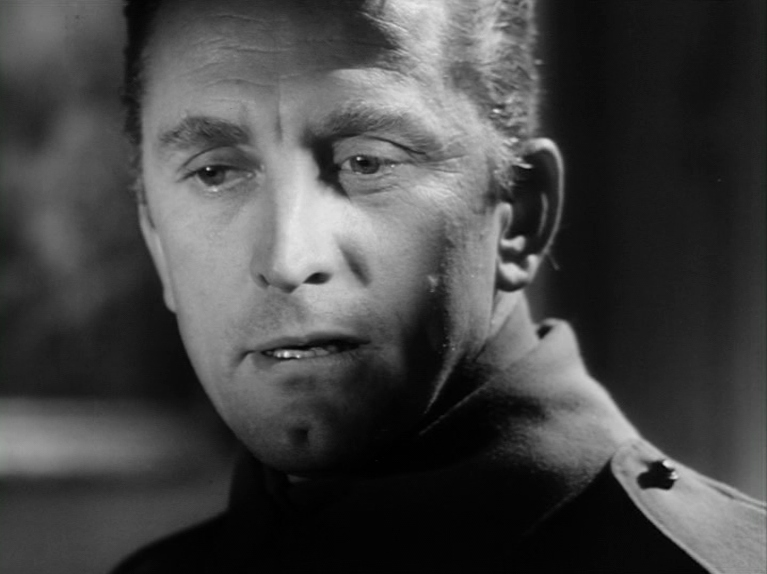
Kirk Douglas as Col. Dax exudes humility and honor.
Through Dax, Kubrick is critical of the bureaucracy of war and the toll it takes on the men seen most expendable. The careless loss of life in a foolish battle plan, actions of friendly fire, and the scapegoating of innocent troops to “discipline” other regiments hold a mirror up and display the ugly side of the human condition. Kubrick would become fascinated with this notion going forward, and Paths of Glory would not be his last film about the politics of war.
Spartacus (1960)
After moderate commercial success with the small-budget films that began his career, Kubrick began to catch the eye of his peers and critics in the film circles of the late-1950s. Universal and Kirk Douglas won the right for Dalton Trumbo’s screenplay for Spartacus, a swords-and-sandals story in the mold of The Ten Commandments and Ben-Hur. Anthony Mann was hired to direct the large production, but after just two weeks he stepped down. Having enjoyed working with him on Paths of Glory, Kirk Douglas asked the studio to hire Stanley Kubrick who agreed. Spartacus is an outlier in Kubrick’s career, it would be the film that he had least control over. With a massive $10 million budget, the studio had a lot of input in decisions made for the film, but it’s still interesting to examine the work of an auteur like Kubrick even when his powers are limited. The film was a box office hit, garnered favorable reviews, and won four Academy Awards.
Despite Kubrick’s not having any input in its screenplay (he made a few re-writes during production), the thinly written Spartacus does have some narrative themes Kubrick had established and would continue to explore the rest of his career. Kirk Douglas stars in the title role, again as a good-hearted man who fights the corrupt authority opposed to his ideology. Spartacus is a slave in the Roman Empire just before the birth of Christ, and as a shift of power would soon cause the empire to tumble. He falls for fellow slave Varinia (Jean Simmons) and as his love for her makes him complete as a man, Kubrick’s theme of love and violence re-emerges. After a revolution gains him freedom from his captors, Spartacus leads his fellow slaves as they grow in power to threaten Roman senator Crassus (Laurence Olivier) and the rest of Rome’s elite class.
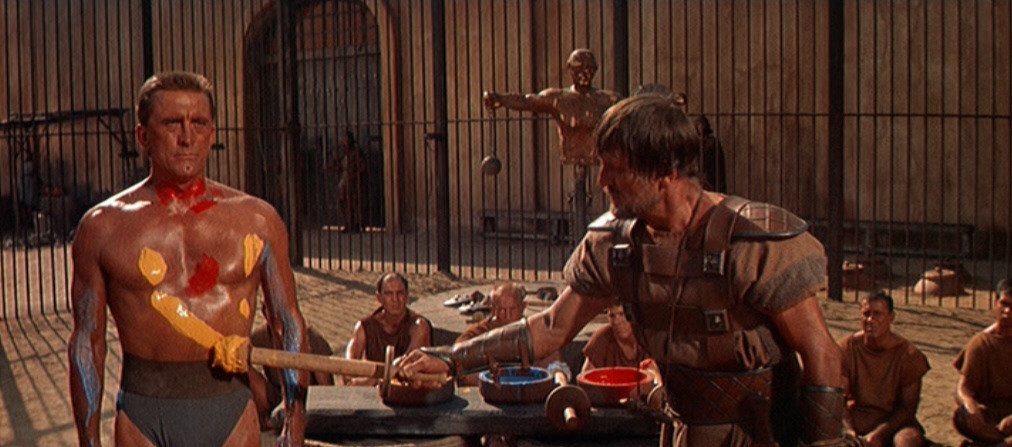
Kubrick’s transition into color and widescreen filmmaking would be seamless (Kirk Douglas as Spartacus).
The first half of Spartacus resembles Kubrick’s earlier work, a character drama of a man who desires to be free above all else and achieves his goal in the second act. Bloody, violent gladiator fights raise the intensity of the action and again reiterate Kubrick’s fascination with love and violence. At the heart of the film is an internal battle between the gladiators and the Romans. Hark and Cohan claim “a dilemma of masculine subjectivity between sexual and class difference results in the men caught between two unsatisfactory models of male powers.”
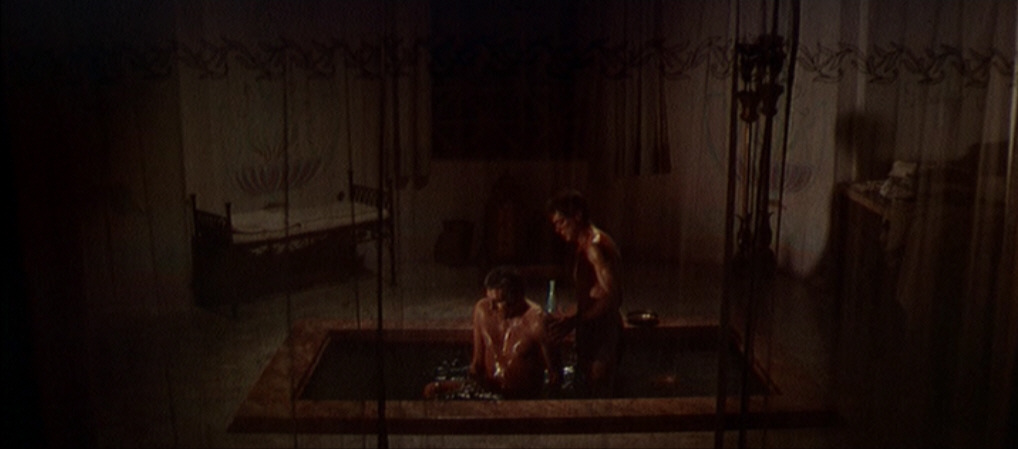
The infamous “Snails or Oysters?” scene displays Kubrick’s ability to show subtextual themes in his films
Kubrick had control over the composition of shots, direction of actors, and had final cut in the editing process. Given his lack of complete control, and the post-code era but not yet a fully liberated Hollywood, Kubrick got creative with some homosexual subtext within the story and the film. The now famous “Snails of Oysters” scene featured Crassus and Antoninus sharing a conversation in a roman bath that borderlines on homoerotic, a tactic that Kubrick (like others) had to tip-toe around do to studio or “code” restriction. Like Hitchcock, Sirk, and other auteurs before him, Kubrick found a way to subvert his themes in the film.
The film is probably too long for its own good (197 minutes), and the second half falls into action spectacle with blood filled battles and behind-closed-door Roman politics, but the film certainly has a few of Kubrick’s signature auteur traits. His long-take tracking shot over the dead bodies in the film’s climactic battle shows his affinity for capturing long-standing action and horrors.
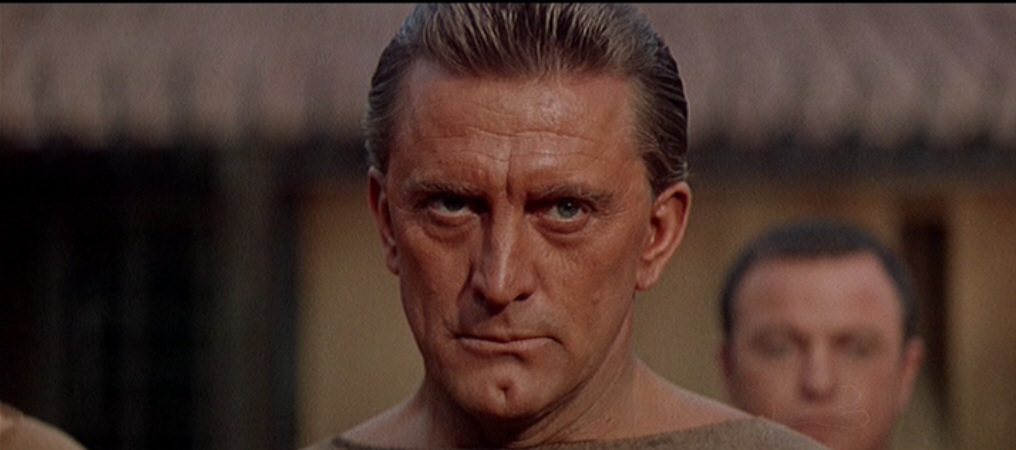
Kirk Douglas delivers an epic close-up for Kubrick, which would become a staple for the auteur
The acting of the film is strong with an accomplished cast. Leading the way isKirk Douglas, Laurence Olivier, Jean Simmons, Tony Curtis, Peter Ustinov (winner of Best Supporting Actor), John Gavin, and Charles Laughton. Kubrick’s work with actors had been smooth and affecting to this point in his career, and working with such a strong ensemble would bode well for his films to come. His use of close-ups with Kirk Douglas would highlight human emotion in a key part of the film and become a signature of his style. The set design, costuming, and make-up (which all won Academy Awards) are all accurate and meticulous for the period film, a standard of verisimilitude Kubrick would control and obsess over in his career and especially in Barry Lyndon.
Spartacus also brought Kubrick into the world of color cinematography, and along with DP Russell Metty, the task of creating 35 mm Super 70 Technorama imagery at a 2.35:1 aspect ratio would enhance his technical prowess for films to come (Barry Lyndon and 2001: A Space Odyssey).
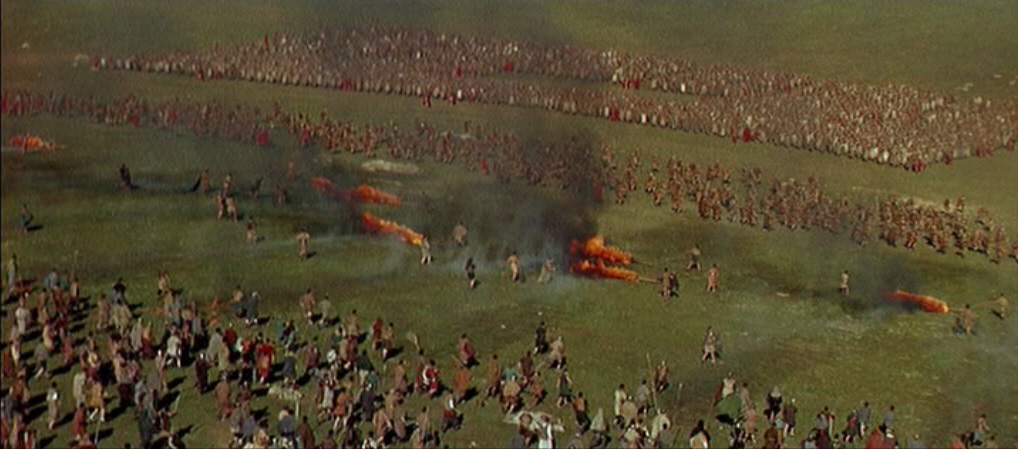
Extreme long shots of a battle field would be landscape composing that Kubrick returns to in future work
Kubrick’s framing and attention to detail when composing shots were up to his typcial standards in Spartacus, knowing full well that he would have to make his impact and imprint on the film somehow with the circumstances. Mise-en-scene is tactical and cinematography painterly in most scenes, with excellent use of set design and backdrop setting the scene of ancient Rome.
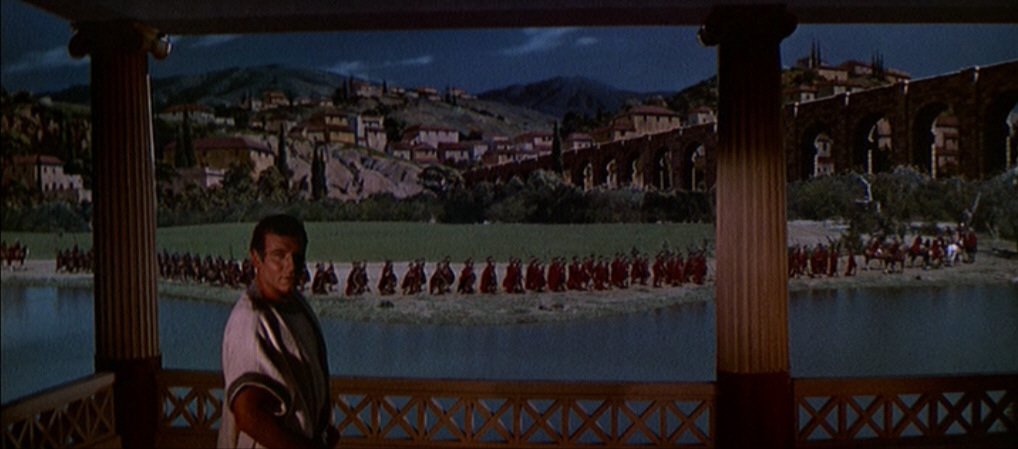
Composing a great image would be one of Kubrick’s best traits as a visual auteur
Although he would disown Spartacus shortly after its release, and call it a “hired hand job,” Kubrick crafted a competent film for Universal and the success would grant him financial and creative asylum the rest of his career. He had paid his dues making good work with smaller scale work, and by producing for the big studio film. He had finally paved the way for himself to choose projects that would not only garner him the success and satisfaction he sought, but the creative control to keep making films headed into the 1960s the only way he knew how–as an auteur of singular vision.

Trackbacks/Pingbacks